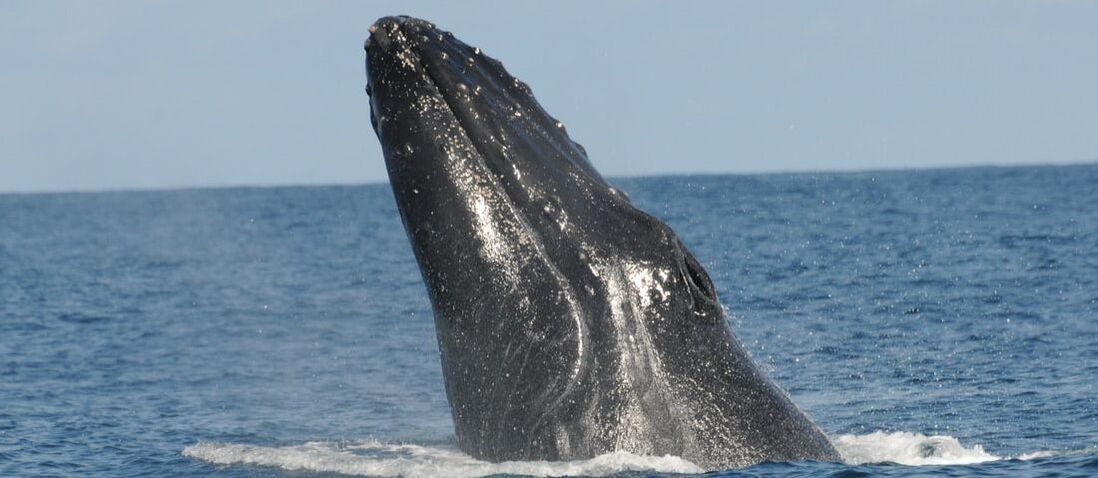 photo by LJMC
photo by LJMC I stumbled across the Soundscapes and Behavioral Research CURE program the fall of my Junior year as I was registering for classes. My roommate was looking for a class relating to marine biology and we decided to take this course together. I had spent the previous summer doing field research on Humpback whales in Stellwagen Bank, Massachusetts and realized this could be a perfect extension to that work. Nonetheless, I had no idea how much I would have the opportunity to learn through this program and that it would quickly become the most impactful course I took during my undergraduate studies.
Taking this class during the Covid-19 pandemic was nothing short of a blessing. Because of the unique opportunity the regulations of the pandemic provided on boating regulations, I was able to research under remarkable circumstances. For my project, I looked at how Humpback whale singing activity in Jardin, Caño Island, Costa Rica was impacted by reduced boat noise pollution under Covid-19 restrictions. I was able to compare the presence versus absence of boat noise and whale singing activity during a normal season-- September, 2019-- and during Covid-19 --September, 2020-- through Arbimon RFCx. It was so cool being able to both hear and see what a Humpback song looks like and also how intense boat noises are.
Singing is an activity typically performed by Humpback males to attract mates and compete with other males. Caño Island is an important breeding ground for Humpbacks and the research showed that Humpback breeding behavior could be negatively impacted by boat noise. It will be exciting to see if more calves are present in Caño Island next year and if the lack of boat noise in the breeding ground contributed to a positive outcome for Humpback breeding.
Because I obtained significant and unique data, I was offered a research position to continue working with Prof. May-Collado and two other students. I hope to be a co-author of a published paper by the end of this project, which is something I never dreamed I would do during my undergraduate experience. I am so grateful for this class because it provided me with scientific research skills in a safe yet challenging setting. I grew both as a researcher and as a scientific writer; I would highly recommend this course to anyone interested in expanding their skills in scientific research or in learning more about acoustic soundscapes. You will be guided through the process of writing a scientific paper while analyzing a unique subset of data. Laura is an incredible mentor. She sets specific deadlines which makes the work manageable, but also pushes students. I was challenged in this course in the best way and learned so much. Take this class!
Taking this class during the Covid-19 pandemic was nothing short of a blessing. Because of the unique opportunity the regulations of the pandemic provided on boating regulations, I was able to research under remarkable circumstances. For my project, I looked at how Humpback whale singing activity in Jardin, Caño Island, Costa Rica was impacted by reduced boat noise pollution under Covid-19 restrictions. I was able to compare the presence versus absence of boat noise and whale singing activity during a normal season-- September, 2019-- and during Covid-19 --September, 2020-- through Arbimon RFCx. It was so cool being able to both hear and see what a Humpback song looks like and also how intense boat noises are.
Singing is an activity typically performed by Humpback males to attract mates and compete with other males. Caño Island is an important breeding ground for Humpbacks and the research showed that Humpback breeding behavior could be negatively impacted by boat noise. It will be exciting to see if more calves are present in Caño Island next year and if the lack of boat noise in the breeding ground contributed to a positive outcome for Humpback breeding.
Because I obtained significant and unique data, I was offered a research position to continue working with Prof. May-Collado and two other students. I hope to be a co-author of a published paper by the end of this project, which is something I never dreamed I would do during my undergraduate experience. I am so grateful for this class because it provided me with scientific research skills in a safe yet challenging setting. I grew both as a researcher and as a scientific writer; I would highly recommend this course to anyone interested in expanding their skills in scientific research or in learning more about acoustic soundscapes. You will be guided through the process of writing a scientific paper while analyzing a unique subset of data. Laura is an incredible mentor. She sets specific deadlines which makes the work manageable, but also pushes students. I was challenged in this course in the best way and learned so much. Take this class!
 RSS Feed
RSS Feed
